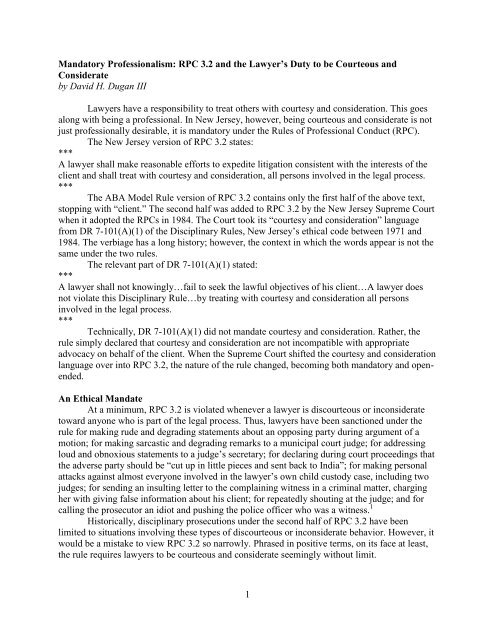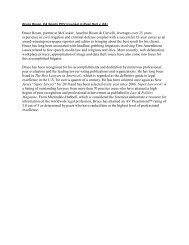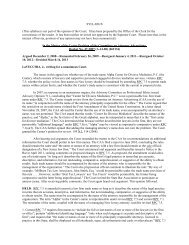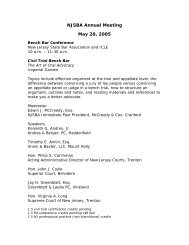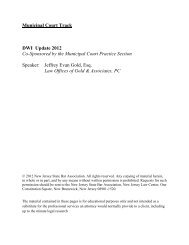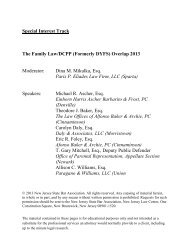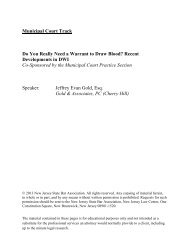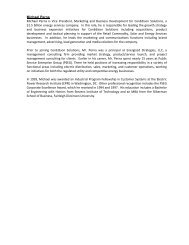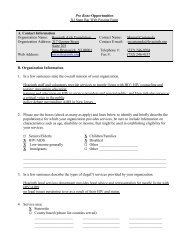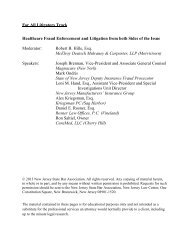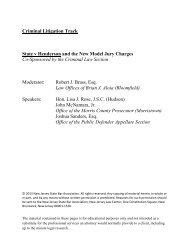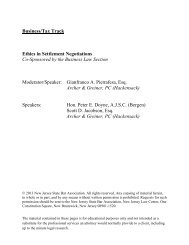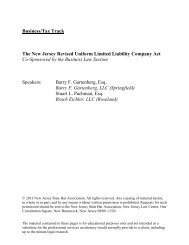Mandatory Professionalism: RPC 3 - New Jersey State Bar Association
Mandatory Professionalism: RPC 3 - New Jersey State Bar Association
Mandatory Professionalism: RPC 3 - New Jersey State Bar Association
Create successful ePaper yourself
Turn your PDF publications into a flip-book with our unique Google optimized e-Paper software.
<strong>Mandatory</strong> <strong>Professionalism</strong>: <strong>RPC</strong> 3.2 and the Lawyer’s Duty to be Courteous andConsiderateby David H. Dugan IIILawyers have a responsibility to treat others with courtesy and consideration. This goesalong with being a professional. In <strong>New</strong> <strong>Jersey</strong>, however, being courteous and considerate is notjust professionally desirable, it is mandatory under the Rules of Professional Conduct (<strong>RPC</strong>).The <strong>New</strong> <strong>Jersey</strong> version of <strong>RPC</strong> 3.2 states:***A lawyer shall make reasonable efforts to expedite litigation consistent with the interests of theclient and shall treat with courtesy and consideration, all persons involved in the legal process.***The ABA Model Rule version of <strong>RPC</strong> 3.2 contains only the first half of the above text,stopping with “client.” The second half was added to <strong>RPC</strong> 3.2 by the <strong>New</strong> <strong>Jersey</strong> Supreme Courtwhen it adopted the <strong>RPC</strong>s in 1984. The Court took its “courtesy and consideration” languagefrom DR 7-101(A)(1) of the Disciplinary Rules, <strong>New</strong> <strong>Jersey</strong>’s ethical code between 1971 and1984. The verbiage has a long history; however, the context in which the words appear is not thesame under the two rules.The relevant part of DR 7-101(A)(1) stated:***A lawyer shall not knowingly…fail to seek the lawful objectives of his client…A lawyer doesnot violate this Disciplinary Rule…by treating with courtesy and consideration all personsinvolved in the legal process.***Technically, DR 7-101(A)(1) did not mandate courtesy and consideration. Rather, therule simply declared that courtesy and consideration are not incompatible with appropriateadvocacy on behalf of the client. When the Supreme Court shifted the courtesy and considerationlanguage over into <strong>RPC</strong> 3.2, the nature of the rule changed, becoming both mandatory and openended.An Ethical MandateAt a minimum, <strong>RPC</strong> 3.2 is violated whenever a lawyer is discourteous or inconsideratetoward anyone who is part of the legal process. Thus, lawyers have been sanctioned under therule for making rude and degrading statements about an opposing party during argument of amotion; for making sarcastic and degrading remarks to a municipal court judge; for addressingloud and obnoxious statements to a judge’s secretary; for declaring during court proceedings thatthe adverse party should be “cut up in little pieces and sent back to India”; for making personalattacks against almost everyone involved in the lawyer’s own child custody case, including twojudges; for sending an insulting letter to the complaining witness in a criminal matter, chargingher with giving false information about his client; for repeatedly shouting at the judge; and forcalling the prosecutor an idiot and pushing the police officer who was a witness. 1Historically, disciplinary prosecutions under the second half of <strong>RPC</strong> 3.2 have beenlimited to situations involving these types of discourteous or inconsiderate behavior. However, itwould be a mistake to view <strong>RPC</strong> 3.2 so narrowly. Phrased in positive terms, on its face at least,the rule requires lawyers to be courteous and considerate seemingly without limit.1
consultation should include explaining to the client that, because the request was made out-oftime,by law the deposition cannot be compelled.Second, since courtesy and consideration should yield to client interest, the lawyer needsto confer with the client in order to determine what client interests may be relevant. It wasobserved earlier that the Model Rule version of <strong>RPC</strong> 3.2, which is identical to the first half of<strong>New</strong> <strong>Jersey</strong>’s version, ends with the phrase “consistent with the interests of the client.” Referringto this phrase, Geoffrey Hazard Jr., W. William Hodes and Peter Jarvis argue in their work TheLaw of Lawyering that only legitimate client interests should be given preference. 3 Once again,in the absence of <strong>New</strong> <strong>Jersey</strong> precedent, that modifier seems reasonable.Returning to the hypothetical, assume that personally you would like to grant youradversary’s request, but your client resists, wanting to take advantage of the adversary lawyer’sfailure. Are you ethically obligated to go along with your client and refuse your adversary’srequest? The answer would depend upon whether taking advantage of the failure reflects alegitimate interest on the part of your client. It is certainly an arguable issue, but the answer isprobably no. However, if you were to demand that your client submit to being deposed after heor she has been told the deposition cannot be compelled, you would surely find yourself with anunhappy client. As a practical matter, if your client is not willing to be deposed you would belikely to support your client’s position regardless of whether a legitimate interest were at stake.Assuming your client does not have a legitimate interest to support a refusal to bedeposed but nonetheless refuses, where does that leave you in terms of your <strong>RPC</strong> 3.2 duty?Presumably, your duty under the rule would not extend to requiring you to cooperate in thedeposition. However, the rule’s open-endedness has not really been tested in litigation. Presently,any limits on the lawyer’s ethical duty to display courtesy and consideration are a matter ofconjecture.<strong>Mandatory</strong> <strong>Professionalism</strong>The second half of <strong>RPC</strong> 3.2 is a clear example of a disciplinary provision that wasconstructed around a professionalism concept. Other examples of such hybrid rules are: 1) <strong>RPC</strong>1.2(b), which encourages lawyers to represent unpopular clients; 2) <strong>RPC</strong> 2.1, which encourageslawyers to represent clients holistically; 3) <strong>RPC</strong> 3.1, which encourages lawyers to reform the lawand improve the legal system; 4) <strong>RPC</strong> 4.4(a), which prohibits lawyers from using meansdesigned to embarrass, delay or burden others; and 5) <strong>RPC</strong> 6.1, which declares that lawyers havea professional responsibility to render public interest legal service.These five rules of professionalism serve to demonstrate that the Rules of ProfessionalConduct are not simply a collection of negative standards useful only for disciplinaryproceedings. Some of the <strong>RPC</strong>s have this limited function; however, many others, andparticularly the five cited here, have an aspirational dimension and help to define lawyer functionat the highest professional level.Conclusion<strong>RPC</strong> 3.2 is a hybrid, and intended to serve a disciplinary function—holding lawyersaccountable if they fail to treat others with courtesy and consideration. At the same time, therule’s open-endedness gives it the sort of aspirational character more typical of professionalism.Vagueness is not a fatal defect for disciplinary standards. 4 Nonetheless, the rule lacks clarity interms of its disciplinary function. Without adequate definition, the rule tends to blur into thewider world of professionalism.3
Endnotes1. See Matter of Rifai, DRB 10-221 (Oct. 26, 2010) and cases cited at pages 9-12.2. See generally, <strong>New</strong> <strong>Jersey</strong> Commission on <strong>Professionalism</strong> in the Law, Principles of<strong>Professionalism</strong> for Lawyers and Judges (1997), available athttp://www.njsba.com/commission_on_prof/index.cfm?fuseaction=principles.3. Geoffrey C. Hazard Jr., W. William Hodes and Peter R. Jarvis, The Law of Lawyering,Third Edition, Section 28.3 (Walters Kluwer, 2011).4. In re Hinds, 90 N.J. 604, 631 (1982).David H. Dugan III is a sole practitioner in Medford. His practice is limited to consulting,providing expert testimony and defending lawyers in ethics and disciplinary matters. He is theauthor of Manual on Legal Ethics, an annually updated publication of the <strong>New</strong> <strong>Jersey</strong> Institutefor Continuing Legal Education.4


